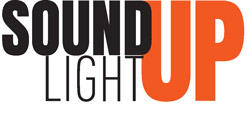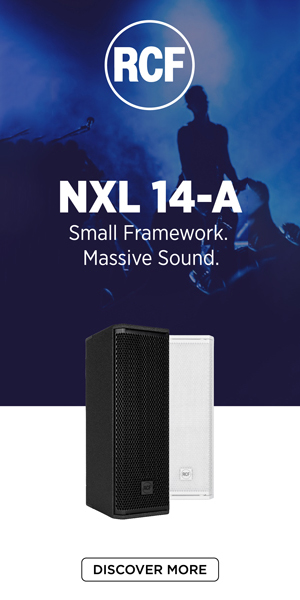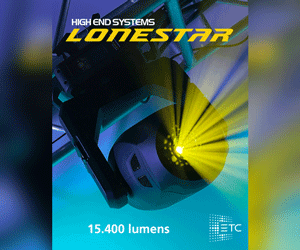This paper is available in too
For the launch of the summer blockbuster film X-Men: Days of Future Past, 20th Century Fox staged its worldwide premiere at the Jacob K. Javits Convention Center on midtown Manhattan’s west side.
The debut of the $200-million-plus film, attended by Hugh Jackman, Jennifer Lawrence, Patrick Stewart, Halle Berry and other stars, was a huge event filling a hall inside the cavernous Javits Center and illuminating a 75-foot-wide screen hung on the hall’s north wall.
The showing also had to be able to reproduce the film’s bombastic 5.1 surround soundtrack, but the Javits is no cinema; the same huge floor-to-ceiling glass wall that offers spectacular views of the Hudson River and New Jersey can also create uncontrollable aural reflections that would turn the hall into an acoustical nightmare.

Event producer Samantha Sackler Productions tapped NYC-based See Factor Industry, its longtime collaborator on east coast events and movie premieres, who called upon the sonic equivalent of a superhero: L-ACOUSTICS’ K2, a lightweight, high-powered, full-range line source array system that made its official debut earlier this year.
For the X-Men premiere, the AV specialist deployed 24 K2, 12 SB28 subs and 16 coaxial 115XT HiQ wedges, all powered and processed by L-ACOUSTICS’ LA8 amplified controllers. See Factor also provided all lighting, rigging and management services for the event.
“When doing movie surround sound events in unconventional venues with very high expectations from the client, and knowing that producers, directors and sound editors will be in the audience, it is quite challenging,” observes Mark Friedman, one of See Factor’s principals. That was certainly the case at the highly reverberant Javits facility, due to its large reflective surfaces.
Friedman notes that reproducing the 5.1 surround soundtrack is important to fully experience a film like X-Men: Days of Future Past. See Factor’s technicians work with cinema-sound specialists from Dolby, as well as projection specialists from Digital Media Systems, to set up the sound system, carefully calibrating parameters such as delays and time alignments between speakers and calculating horizontal and vertical dispersion patterns. However, in such a reverberant environment that process is vastly more complicated.

“It’s rare that you’d need to use a system as large as a K2 for a film premiere,“ says Friedman, who adds that See Factor has also deployed L-ACOUSTICS KARA systems for the debut of other films such as the newly released James Brown biopic Get On Up, which premiered at Harlem’s Apollo Theater, the opening night of this year’s Tribeca Film Festival at the Beacon Theatre, and the now-classic Johnny Cash biography Walk The Line, which had its debut at the Hammerstein Ballroom. “But the Javits is huge and called for a much larger sound system.”
It also called for a smart, flexible sound system, and the K2 is exactly that. The K2 was configured in three hangs of eight modules each for the left-center-right cinema-sound frontal array, with eight 115XT HiQ wedges arrayed on either side of the room as surround speakers.
On the hang closest to the glass wall, the K2‘s unique PANFLEX asymmetrical variable horizontal coverage technology came into play with that speaker hang having the directional fins on the speakers set for 35 degrees of horizontal dispersion while the right hand was set for 55 degrees, thus keeping the sonic energy off the reflective glass surface and focused on the audience seating area.
The angles were determined based on the use of L-ACOUSTICS’ SOUNDVISION 3D acoustical simulation software, which offers real-time mapping in coverage and delay modes, including time-delay optimization, and subwoofer acoustical and mechanical data. In addition, the operation of all of the speakers, zones and LA8 amplifiers were coordinated through L-ACOUSTICS’ Network Manager, which provides a graphical interface optimized for tablet PC use and lets systems designers place units and groups in the workspace in a way that reflects their location in the field.
“This is what really made it work – the ability of PANFLEX to precisely aim the sound asymmetrically to avoid reflected sound,” explains Friedman. “At the same time, the DSP algorithms in Network Manager provided complete control over the amplifiers and speaker zones. K2’s PANFLEX gave us the physical level of control while Network Manager gave us the electronic plane of control, and those tools were invaluable.”
Dolby Sound Engineer David Berti was responsible for calibrating the audio for both the X-Men and James Brown premieres. “The See Factor crew was very professional and easy to work with, and they nailed both shows,” he says. “The audio playback was extremely accurate to cinema standards, and See Factor’s designs, speaker selection and positioning made my job of tuning the rooms very straightforward, yielding the correct playback response expected by the film makers. Both film companies were very happy with the results stating that the sound far exceeded their expectations.”
For more info on See Factor Industry, visit www.facebook.com/seefactor







